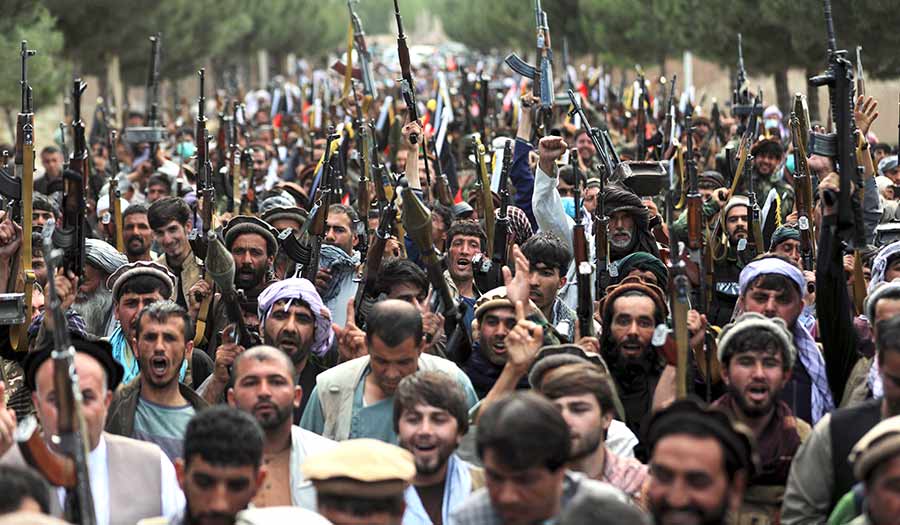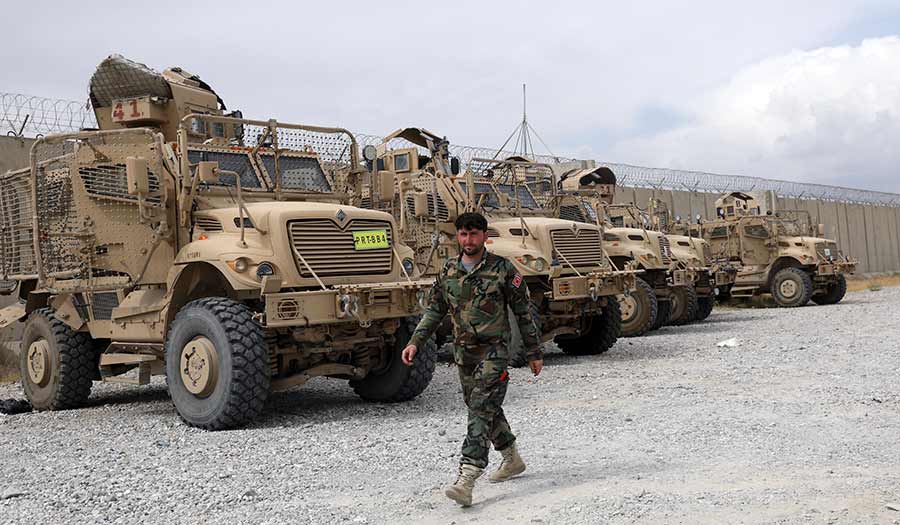 AP/Rahmat Gul
AP/Rahmat Gul
World News Desk
Learn the why behind the headlines.
Subscribe to the Real Truth for FREE news and analysis.
Subscribe NowISLAMABAD (AP) – The Taliban say they do not want to monopolize power, but they insist there will not be peace in Afghanistan until there is a new negotiated government in Kabul and President Ashraf Ghani is removed.
In an interview with The Associated Press, Taliban spokesman, Suhail Shaheen, who is also a member of the group’s negotiating team, laid out the insurgents’ stance on what should come next in a country on the precipice.
The Taliban have swiftly captured territory in recent weeks, seized strategic border crossings and are threatening a number of provincial capitals—advances that come as the last U.S. and NATO soldiers leave Afghanistan.
This week, the top U.S. military officer, General Mark Milley, told a Pentagon press conference that the Taliban have “strategic momentum,” and he did not rule out a complete Taliban takeover. But he said it is not inevitable. “I don’t think the end game is yet written,” he said.
Memories of the Taliban’s last time in power some 20 years ago, when they enforced a harsh brand of Islam that denied girls an education and barred women from work, have stoked fears of their return among many. Afghans who can afford it are applying by the thousands for visas to leave Afghanistan, fearing a violent descent into chaos. The U.S.-NATO withdrawal is more than 95 percent complete and due to be finished by August 31.
Mr. Shaheen said the Taliban will lay down their weapons when a negotiated government acceptable to all sides in the conflict is installed in Kabul and Mr. Ghani’s government is gone.
“I want to make it clear that we do not believe in the monopoly of power because any governments who [sought] to monopolize power in Afghanistan in the past, were not successful governments,” said Mr. Shaheen, apparently including the Taliban’s own five-year rule in that assessment. “So we do not want to repeat that same formula.”
But he was also uncompromising on the continued rule of Mr. Ghani, calling him a war monger and accusing him of using his Tuesday speech on the Islamic holy day of Eid-al-Adha to promise an offensive against the Taliban.
Mr. Shaheen dismissed Mr. Ghani’s right to govern, resurrecting allegations of widespread fraud that surrounded Ghani’s 2019 election win. After that vote, both Mr. Ghani and his rival Abdullah Abdullah declared themselves president. After a compromise deal, Mr. Abdullah is now No. 2 in the government and heads the reconciliation council.
Mr. Ghani has often said he will remain in office until new elections can determine the next government. His critics—including ones outside the Taliban—accuse him of seeking only to keep power, causing splits among government supporters.
Last weekend, Mr. Abdullah headed a high-level delegation to the Qatari capital of Doha for talks with Taliban leaders. It ended with promises of more talks, as well as greater attention to the protection of civilians and infrastructure.
Mr. Shaheen called the talks a good beginning. But he said the government’s repeated demands for a cease-fire while Mr. Ghani stayed in power were tantamount to demanding a Taliban surrender.
“They don’t want reconciliation, but they want surrendering,” he said.
Before any cease-fire, there must be an agreement on a new government “acceptable to us and to other Afghans,” he said. Then “there will be no war.”
Mr. Shaheen said there are no plans to make a military push on Kabul and that the Taliban have so far “restrained” themselves from taking provincial capitals. But he warned they could, given the weapons and equipment they have acquired in newly captured districts. He contended that the majority of the Taliban’s battlefield successes came through negotiations, not fighting.
“Those districts which have fallen to us and the military forces who have joined us…were through mediation of the people, through talks,” he said. “They [did not fall] through fighting…it would have been very hard for us to take 194 districts in just eight weeks.”
The Taliban control about half of Afghanistan’s 419 district centers, and while they have yet to capture any of the 34 provincial capitals, they are pressuring about half of them, Gen. Milley said. In recent days, the U.S. has carried out airstrikes in support of beleaguered Afghan government troops in the southern city of Kandahar, around which the Taliban have been amassing, Pentagon press secretary John Kirby said Thursday.
The rapid fall of districts and the seemingly disheartened response by Afghan government forces have prompted U.S.-allied warlords to resurrect militias with a violent history. For many Afghans weary of more than four decades of war, that raises fears of a repeat of the brutal civil war in the early 1990s in which those same warlords battled for power.
“You know, no one no one wants a civil war, including me,” said Mr. Shaheen.
- World News Desk
- INTERNATIONAL
 When Is the U.S. War in Afghanistan Really Over?
When Is the U.S. War in Afghanistan Really Over?
More on Related Topics:
- Iran Commemorates 1979 Revolution as Nation Is Squeezed by Anger Over Crackdown and Tensions with U.S.
- The Gaza Ceasefire Began Months Ago. Why Does Fighting Persist?
- Activists Say Iran’s Crackdown Has Killed at Least 6,221 People, as the Country’s Currency Plunges
- Explainer: What Is the Status of Iran’s Main Nuclear Facilities?
- Iran Signals Plans for Fast Trials and Executions While Promising ‘Decisive Response’ to U.S., Israel


